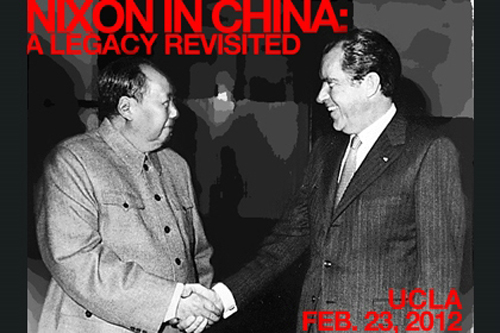Experts come together on Jan. 23 to discuss historic meeting
By Rebecca Kendall
Director of Communications

President Richard Nixon's historic visit to Beijing and Shanghai 40 years ago this month, and his meetings with Chairman Mao, had enormous repercussions in the ensuing decades for U.S.–China relations and the international order. It was first time an American president had visited the People's Republic of China, a nation that at the time considered the United States to be its staunchest enemy.
"Today, 'Nixon goes to China' is shorthand for a bold political move that overturns preconceptions," said Kal Raustiala, director of the UCLA Burkle Center for International Relations, which is co-hosting a conference on the historic event with the UCLA Center for Chinese Studies and the UCLA Confucius Institute. "Richard Nixon was a staunch anti-communist who nonetheless recognized that the U.S.–China relationship was absolutely critical to our nation's future, and he made re-engaging China a centerpiece of his foreign policy."
On Feb. 23, experts will come together at UCLA to discuss the significance of this meeting in relation to the domestic and international politics of the 1970s and its enduring legacy for relations between the two nations today. The daylong conference, which will run from 10 a.m. to 4:30 p.m. at the UCLA James West Alumni Center(map), will include a wide array of experts on China, Nixon and foreign policy and will feature never-before-seen footage of the historic visit taken by the late H.R. Haldeman, a UCLA graduate who served as White House chief of staff to President Nixon.
"This event will examine what it meant for Nixon — and his equally savvy and strategic partner, Mao Zedong — to meet on Mao's home turf," Raustiala said. "It will also explore how that electrifying meeting both shocked the world of the 1970s and helped create the world we live in today."
The day's keynote speaker is Ambassador Richard Solomon, president of the United States Institute of Peace and former assistant secretary of state for East Asia. He will be interviewed by James Mann, author of "Rise of the Vulcans" and "The China Fantasy."
Additional speakers include General Wesley K. Clark, a senior fellow at the UCLA Burkle Center for International Relations; Chen Jian, Michael J. Zak chair of History for U.S. China Relations at Cornell University; Tim Naftali, New America Foundation senior research fellow and presidential scholar; Minxin Pei, director of the Keck Center for International and Strategic Studies at Claremont McKenna College; Julia C. Strauss, a senior lecturer in the School of Oriental and African Studies at the University of London and a visiting researcher at the UCLA Asia Institute; and Susan Shirk, director of the University of California system-wide Institute on Global Conflict and Cooperation, Ho Miu Lam Chair of China and Pacific Relations at the University of California, San Diego, and the author of “China:Fragile Superpower.”
Pre-registration for the "Nixon in China:A Legacy Revisited" conference is required. The registration fee, which includes beverages and lunch, is $40 for the general public and $15 for students with ID.
Burkle Center for International Relations





















